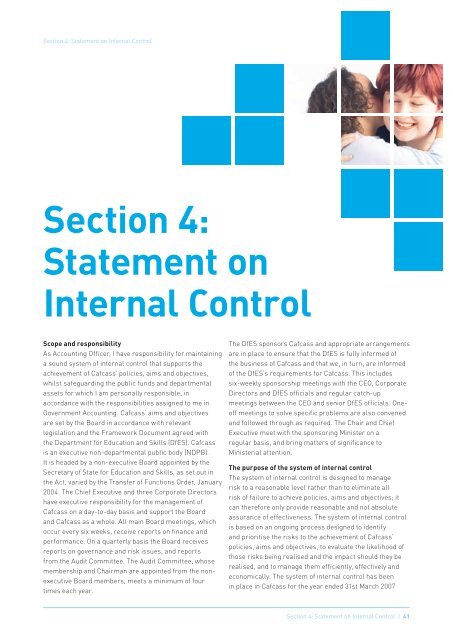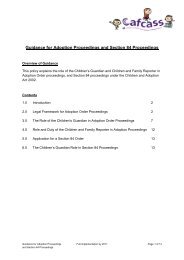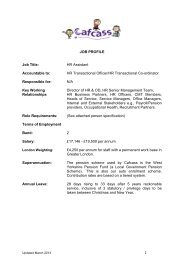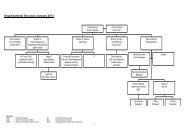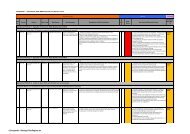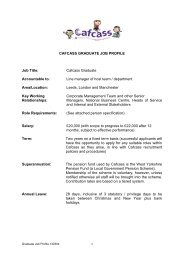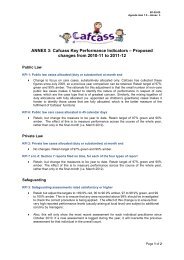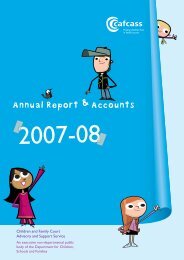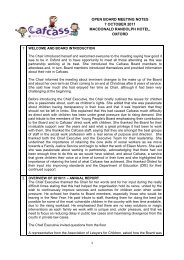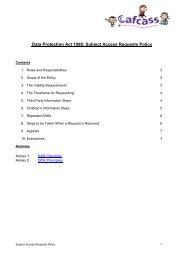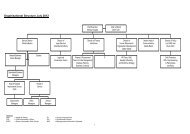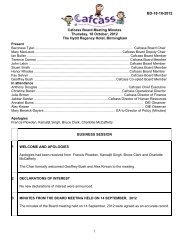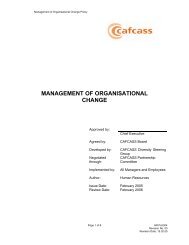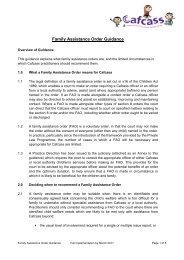Annual Report 2006-2007 - Cafcass
Annual Report 2006-2007 - Cafcass
Annual Report 2006-2007 - Cafcass
Create successful ePaper yourself
Turn your PDF publications into a flip-book with our unique Google optimized e-Paper software.
Section 4: Statement on Internal Control<br />
Section 4:<br />
Statement on<br />
Internal Control<br />
Scope and responsibility<br />
As Accounting Officer, I have responsibility for maintaining<br />
a sound system of internal control that supports the<br />
achievement of <strong>Cafcass</strong>’ policies, aims and objectives,<br />
whilst safeguarding the public funds and departmental<br />
assets for which I am personally responsible, in<br />
accordance with the responsibilities assigned to me in<br />
Government Accounting. <strong>Cafcass</strong>’ aims and objectives<br />
are set by the Board in accordance with relevant<br />
legislation and the Framework Document agreed with<br />
the Department for Education and Skills (DfES). <strong>Cafcass</strong><br />
is an executive non-departmental public body (NDPB).<br />
It is headed by a non-executive Board appointed by the<br />
Secretary of State for Education and Skills, as set out in<br />
the Act, varied by the Transfer of Functions Order, January<br />
2004. The Chief Executive and three Corporate Directors<br />
have executive responsibility for the management of<br />
<strong>Cafcass</strong> on a day-to-day basis and support the Board<br />
and <strong>Cafcass</strong> as a whole. All main Board meetings, which<br />
occur every six weeks, receive reports on finance and<br />
performance. On a quarterly basis the Board receives<br />
reports on governance and risk issues, and reports<br />
from the Audit Committee. The Audit Committee, whose<br />
membership and Chairman are appointed from the nonexecutive<br />
Board members, meets a minimum of four<br />
times each year.<br />
The DfES sponsors <strong>Cafcass</strong> and appropriate arrangements<br />
are in place to ensure that the DfES is fully informed of<br />
the business of <strong>Cafcass</strong> and that we, in turn, are informed<br />
of the DfES’s requirements for <strong>Cafcass</strong>. This includes<br />
six-weekly sponsorship meetings with the CEO, Corporate<br />
Directors and DfES officials and regular catch-up<br />
meetings between the CEO and senior DfES officials. Oneoff<br />
meetings to solve specific problems are also convened<br />
and followed through as required. The Chair and Chief<br />
Executive meet with the sponsoring Minister on a<br />
regular basis, and bring matters of significance to<br />
Ministerial attention.<br />
The purpose of the system of internal control<br />
The system of internal control is designed to manage<br />
risk to a reasonable level rather than to eliminate all<br />
risk of failure to achieve policies, aims and objectives; it<br />
can therefore only provide reasonable and not absolute<br />
assurance of effectiveness. The system of internal control<br />
is based on an ongoing process designed to identify<br />
and prioritise the risks to the achievement of <strong>Cafcass</strong>’<br />
policies, aims and objectives, to evaluate the likelihood of<br />
those risks being realised and the impact should they be<br />
realised, and to manage them efficiently, effectively and<br />
economically. The system of internal control has been<br />
in place in <strong>Cafcass</strong> for the year ended 31st March <strong>2007</strong><br />
Section 4: Statement on Internal Control | 41


